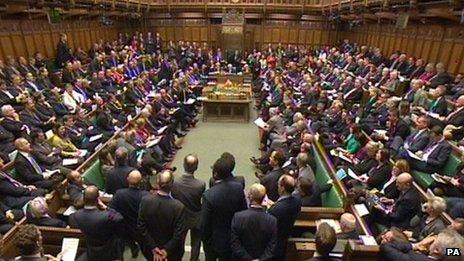Put misbehaving MPs in 'sin bin', think tank recommends
- Published
Speaker tells Education Secretary Michael Gove told to write lines
The Commons Speaker should be given a new power to send MPs misbehaving at Prime Minister's Questions to a "sin bin", a think tank has said.
The Hansard Society said 47% of the public thought the weekly Commons clash was "too noisy and aggressive".
The Speaker can already eject MPs from the chamber for five days or more for severe transgressions of Commons rules.
But banishment to the "sin bin" would last only until the end of the half-hour question session.
The think tank also recommended Prime Minister's Questions (PMQs) should be rescheduled from its Wednesday lunchtime slot, which "disproportionately enables only those aged over 55 to watch it in full", to primetime on Tuesday or Wednesday evening.
'More discursive'
Research it commissioned suggested 67% of people thought there was "too much party political point-scoring instead of answering the question" at PMQs.
Just 36% of respondents found the sessions informative, with 20% saying they were not informative.
Some 16% agreed with the statement "MPs behave professionally", but 48% disagreed. PMQs made 12% of those surveyed "proud of our Parliament", but 45% said it did not.
Speaker tells a noisy MP: "The lion must get back in its den"
Pollsters Ipsos Mori also found 16% of the public said they had watched PMQs in full, and 38% had seen clips of the question session, at which the prime minister faces a total of six questions from the opposition leader and a string of other questions from hostile and friendly backbenchers.
The prime minister usually has no notice of the questions to be asked, although it is widely assumed some of the questions from the government benches are distributed by party officials to facilitate discussion of a favoured topic.
The Hansard Society, which describes itself as a non-partisan political research and education organisation campaigning for a "strong Parliament and an informed and engaged citizenry", put forward a series of proposals for reform to address the problems it identified.

Some PMQs participants have likened the experience to facing a "wall of sound"
"The format should be varied to facilitate a more discursive approach, pursuing genuine debate on just a few topical areas as well as more rapid-fire Q&As," the society said.
The opposition leader's allocation of questions should be cut to "free up time for more questions from backbenchers" and more questions should be grouped together with a focus on specific subjects, it added.
Finally, "citizens could be invited, once a month, to submit questions for consideration at PMQs", it suggested. "New technology means this can be done in simple and cost-effective ways."
'Damaging and misleading'
Commons Speaker John Bercow frequently deploys a range of techniques at PMQs, aiming to calm rowdy parliamentarians.
He recently rebuked Education Secretary Michael Gove, telling him: "You need to write out a thousand times, 'I will behave myself at Prime Minister's Questions.'"
"The Speaker's first responsibility is to maintain order but he cannot do so if MPs persist in wilfully misbehaving week after week," the Hansard Society said in its latest report.
"The Speaker needs to be empowered - with cross-party agreement - to take a tougher stance when members misbehave and thereby bring the House of Commons and Parliament into disrepute."
John Bercow tells Labour MP Tom Blenkinsop: "Calm yourself; take up yoga"
The report's co-author Dr Ruth Fox, head of research at the Hansard Society, said: "PMQs is a cue for the public's wider perceptions of Parliament. It provides a lot of the raw material that feeds their negative assumptions about politicians.
"The public think the conduct of MPs is childish and wouldn't be tolerated in other work places. They think politicians are simply not taking the issues that affect their lives seriously enough.
"As Parliament's 'shop window', it portrays a damaging and misleading impression of what happens at Westminster because the public think that what happens at PMQs is how Parliament works all the time.
"Reform is overdue if PMQs is to move from being an inward-looking and self-referential event towards its proper role of scrutiny and accountability."
The research was carried out by Ipsos Mori, which conducted face-to-face interviews between 6 and 13 December 2013 with a representative sample of 1,286 British adults.
- Published30 January 2014
- Published5 February 2013
- Published4 February 2013